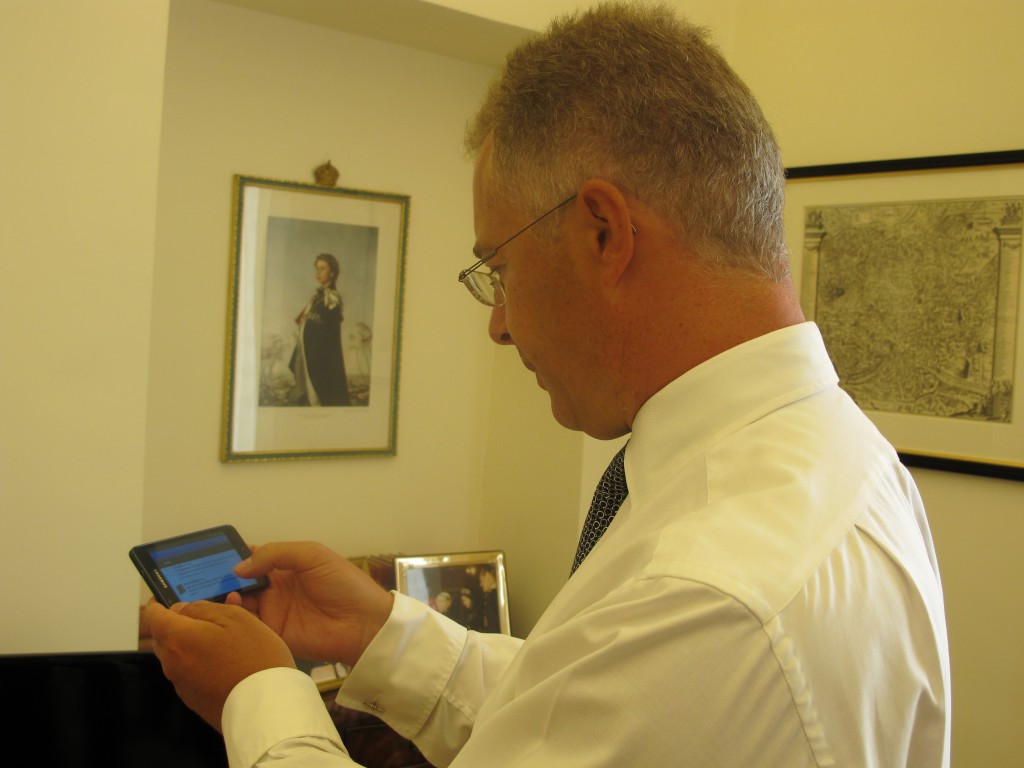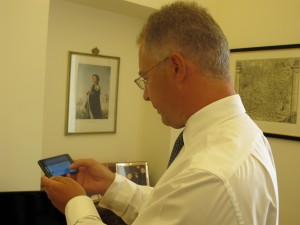19th September 2013
Questions about the Holy See


I recently ran a competition on Twitter, inviting questions about the Holy See and the UK’s relationship with it. The response was impressive, with many searching questions. Below are the winners, their questions, and slightly lengthier answers than the 140 characters Twitter permits.
Q. What made possible the great shift from historical anti-Catholicism to dialogue and confidence in UK/Vatican relations? – submitted by Giulio
My Twitter answer was: “Time. Vatican II. Ecumenism. Popes since WWII. 1982 Papal visit. Basil Hume. Northern Ireland dialogue. Better UK understanding.” All were key elements, Giulio, and I don’t think it is possible to say there was one single factor. You are right that well into the twentieth century there was residual nervousness in the UK, reflecting historical relationships since the Reformation, about establishing a full diplomatic presence in Rome. Ironically, though, the Holy See and Britain were great allies in the war against Napoleon, reflected in the Lawrence portrait of Pope Pius VII that hangs in the Waterloo Gallery at Windsor Castle. It helps, now, that religion is not a visceral issue in British domestic affairs, and that the Pope is a spiritual – albeit global – but not a temporal leader. There is so much we can do together.
Q. What can the UK learn from the Holy See’s role in international affairs and global diplomacy? – submitted by Jamie Kerr
Jamie, the universality of the Holy See’s approach is always impressive. Yes, it does have its own ‘interests’ – but how many other world leaders address global issues with the deep concern for human dignity that we see from the Pope? Holy See diplomacy is patient and cautious, sometimes excessively so, but with a long term perspective that tends to trump electoral cycles and short term considerations. Patience is definitely a diplomatic virtue.
Q. The strong UK relationship with the Holy See is well known, especially under Benedict XVI. What differences under Pope Francis? – submitted by Domenico Musso
Q. Has life / work as a diplomat changed at all since Pope Francis was elected – if so how? – submitted by Rory O’Donovan
I would not underestimate the importance of continuity as well as change. Pope Francis has several times stressed his deep respect for the legacy of his predecessor. And the universal values remain the same. But it is clear, Domenico, that there is a new emphasis on some areas including human trafficking, development issues and the need for an activist Holy See foreign policy, all of which we welcome and provide new terrain for engagement across our mutual global concerns. As for the diplomats, Rory, life is that little bit more hectic – everyone has an opinion on Pope Francis, and that means Foreign Ministries round the world want to know what’s going on. It’s up to us to tell them…
Congratulations to the winners of our competition, and I look forward to meeting you. You will all receive a copy of our recent publication: Britain and the Holy See, A Celebration of 1982 and the Wider Relationship. And my thanks to everyone who sent questions from around the world. They demonstrate just how strong interest is in the Holy See at present.
Thank you very much, Your Excellency, for Your answer.
I totally agree with You, especially on the complex point concerning the temporal power of the Church and its perceptions in English constitutionalism. Indeed, I feel that one of the most engaging issues in the lengthy and fascinating history of modern English political and constitutional thought comes to be represented by the view (epitomized in Locke’s most famous “Letter concerning toleration”, embedded in the Toleration Act and so on) of Catholicism as “politically intolerable”, being a source of conflicting loyalties in the state. To put it in another way, by the idea that being Catholic and, at a time, loyal subjects-citizens in a nation committed to the preservation of individual liberty was almost impossible, and this because of the “clumsy” presence of a “foreign Head of State (the Pope)” who, as spiritual leader and Vicar of Christ, also had the power to impose to its subjects a definite stance on matters of conscience. In this form, the conflict between modern state and Catholic universalism (an European conflict, leading to Reformation and secularization, as we all know too well) in England reached a very high and “dramatical” cultural/political pitch. I wonder wheter this might be in some ways historically connected with the ascendance of medieval motifs, first of all the representation of formal legitimacy of political power in the British Isles as being connected to the Papacy (much similarities here with the Norman kingdom of Sicily, where I “come from”, being an Italian southerner). A representation which led to clashes and conflicts as the lay state-building progressed (e.g., the dispute between Innoncentius III and John Lackland; the assassination of St. Thomas Becket…), ultimately culminating in King Henry VIII’s breach from Rome and the foundation of the Anglican church (not to mention, a century and a half later, James II’s reign, the Declaration of Indulgence and the Glorious Revolution). The theme is extremely rich and I could go on to unbearable lengths in discussing it (and I feel I don’t possess in the very least degree the competence to do so!): for example, during this tormented history of a lost love (I may be so bold) between England and the Church, one should also consider the importance of the XIX century, which You justly underlined mentioning the cooperation during the Napoleonic wars, and which could be continued considering the influence of the Oxford circle and the rise of anglo-catholicism, the steady decline of traditional whiggism (and its hatred for “Popery”, rooted in the struggles against the royal Stuarts and their supporters), and so on. What’s most important to consider, though, is that now the situation has changed for good: the crisis of “modernity” poses vast challenges both to the noble English constitutionalism and to the Catholic identity; Vatican II continues to urge the Church toward an ever-increasing understanding of contemporary world and towards a global projection as a spiritual force (as You rightly say); meanwhile, the British system faces postmodern complexity too (as a “jurist”, my mind goes firstly to the problems of European integration, with the “threats” of its charters and treaties, their value etc.). I’m certain, with You, that both England and the Church have a long and windy road awaiting them, but we now know that this road can be taken together, with a steadily strenghtening mutual comprehension, respect and even affection. Again, many thanks for Your twitter challenge and Your patience!